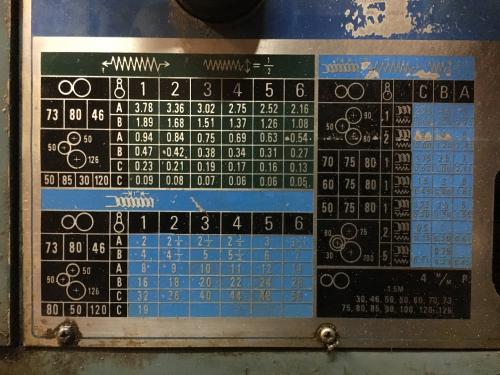08-23-2017, 07:19 AM
Had to do my first bit of thread chasing the other night on my 80's Takisawa lathe (TSL1000-D).
It has a quick change gearbox and I knew it was capable of both metric and imperial threads but hadn't really looked at the chart before, let alone tried to interpret it.
The only change gears I have are the ones currently fitted 50T , 50T, 60T, and 120T.
Trying to get my head around the chart:

Here's how I interpret it:
Top left chart - feed pitches (crossfeed is half the value shown)
- Being a Taiwanese lathe and the max feed rate is 3.78 I'm guessing the values are mm (per spindle rev).
- To get very coarse feeds you require 73/80/46 gears
- to get the very fine ones you need 50/85/30/120
Bottom left chart - imperial threading values are TPI
- pretty obvious, but note there's no way of getting 13 TPI (required for 1/2" UNC)
Top right chart - metric threading pitches, and feeds (self explanatory).
Bottom right
- Not sure what the 4mm P means, or the 1.5M
- the long list of numbers is the full list of change gears for all the charts shown.
Does that sound reasonable, and can anyone throw some light on the parts I'm not sure about?
Steve
It has a quick change gearbox and I knew it was capable of both metric and imperial threads but hadn't really looked at the chart before, let alone tried to interpret it.
The only change gears I have are the ones currently fitted 50T , 50T, 60T, and 120T.
Trying to get my head around the chart:
Here's how I interpret it:
Top left chart - feed pitches (crossfeed is half the value shown)
- Being a Taiwanese lathe and the max feed rate is 3.78 I'm guessing the values are mm (per spindle rev).
- To get very coarse feeds you require 73/80/46 gears
- to get the very fine ones you need 50/85/30/120
Bottom left chart - imperial threading values are TPI
- pretty obvious, but note there's no way of getting 13 TPI (required for 1/2" UNC)
Top right chart - metric threading pitches, and feeds (self explanatory).
Bottom right
- Not sure what the 4mm P means, or the 1.5M
- the long list of numbers is the full list of change gears for all the charts shown.
Does that sound reasonable, and can anyone throw some light on the parts I'm not sure about?
Steve






